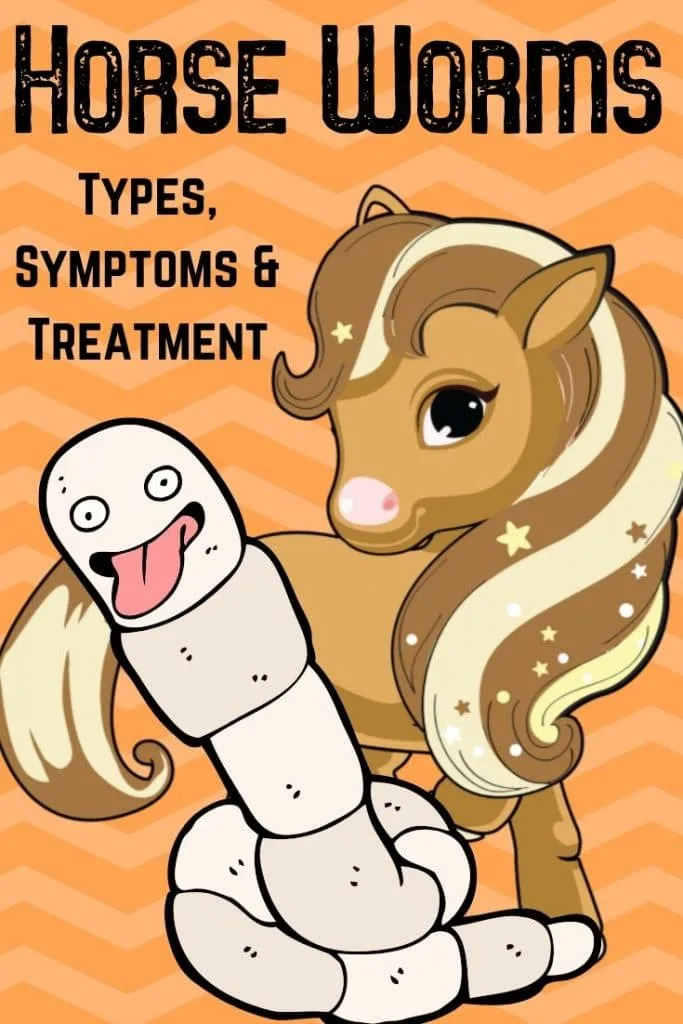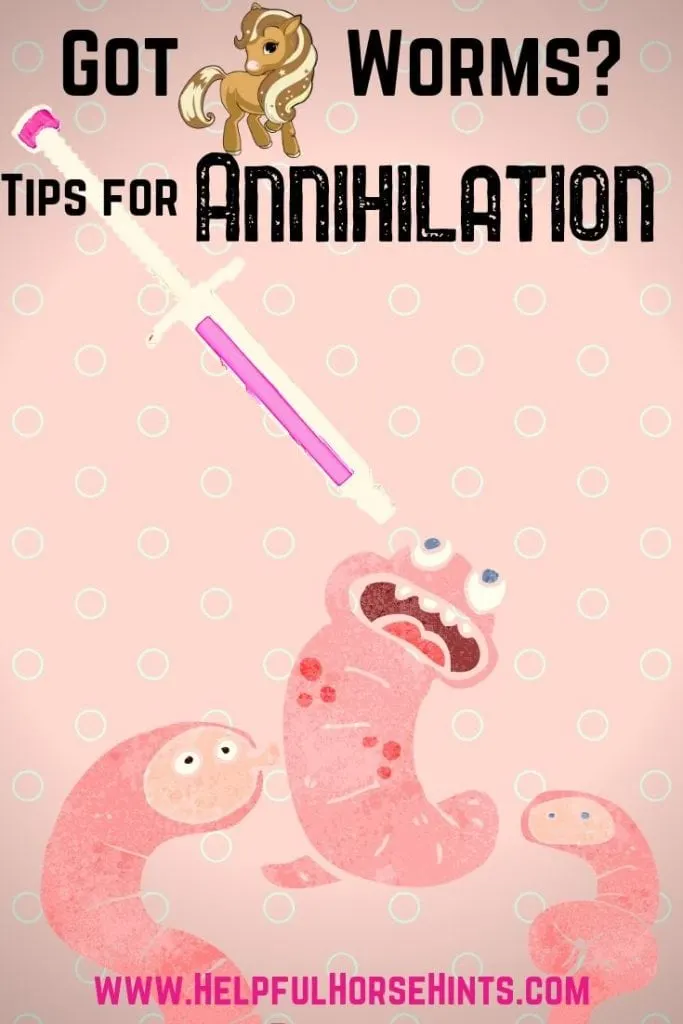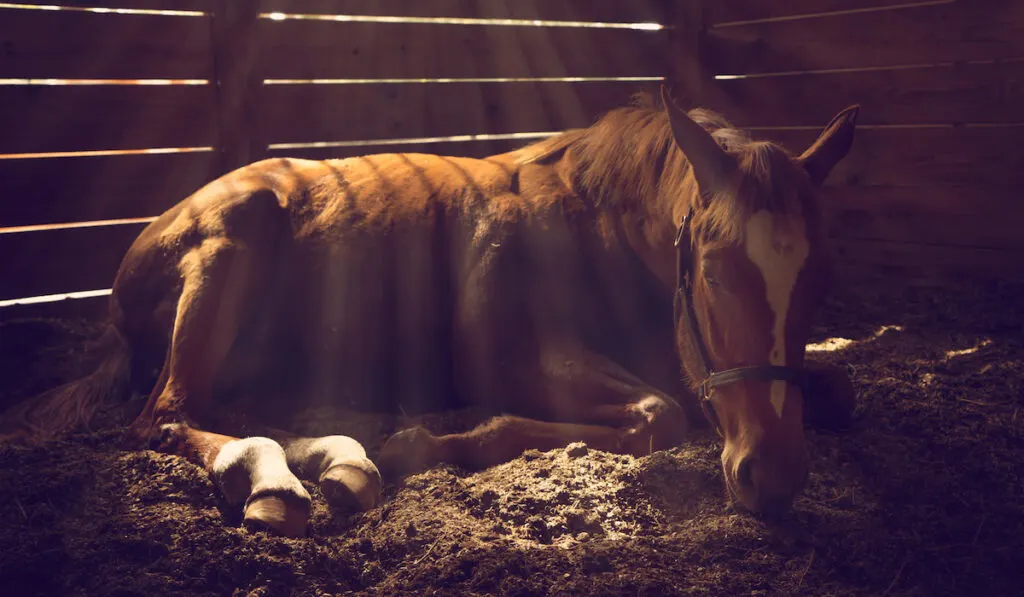Every animal can fall prey to parasites and horses are no exception. There is a lot of conflicting ideas out there concerning horse worms and deworming, but the information provided here will help you distinguish fact from fiction.
All horses are vulnerable to worms just like any other farm animals. Horse worms are so common, in fact, that every horse owner should deworm their horse at least a couple times a year. If not, there are a number of health issues that your horse could potentially suffer from.
Horses can come in contact with over 150 different parasites (source). With the right knowledge, proper treatment program, and preventative measures, you can protect your horse from worm infestations.

Table of Contents
Common Types of Horse Worms
Small Strongyles
This is the most common type of worm that a horse can suffer from. They are ingested when horses consume grass that has small strongyle eggs in it.
These parasites can live within the wall of a horse’s intestines for months. The adult worm eggs are released through a horse’s manure and back onto the grass, starting the cycle over again.
In small numbers, these worms are not harmful, however, if the infestation grows into a massive accumulation, they can cause severe gastric problems in horses.
Large Strongyles (bloodworms)
This red or grey worm collects in a horse’s blood vessels and causes blockages. This can cause damage to a horse’s intestines causing severe gastric issues.
Large strongyles feed on a horse’s blood and can cause a horse to become anemic. They can travel throughout a horse’s body and even into their internal organs. This worm is less common in today’s world, but they can cause the most damage to a horse.
Roundworms (Ascarids)
Roundworms, also called Ascarids, enter a horse’s body through food they ingest and the parasite travels through the horse’s intestines into the liver and lungs.
Adult female roundworms release their eggs into a horse’s manure. These eggs can remain “alive” on the ground for years, making the risk of re-infestation more likely. Horses that are under 3 years old are the most vulnerable to this type of worm.
Pinworms
These white and grey worms migrate through the horse’s body and eventually lay their eggs in the horse’s rectum, causing them to itch severely. This can result in hair loss and open wounds if a horse scratches against a hard surface.
Horses can become infected with pinworms from feed, water, and any barn surface where these worms attach themselves as the horses try to scratch off the parasite.
Tapeworms
This type of worms gathers in groups inside the small and large intestines. This collection of parasites wreaks havoc on a horse’s digestive system.
Mites ingest tapeworm eggs and then in turn, they are ingested by a horse that is grazing on grass and other natural forages. These parasites can cause severe digestive issues resulting in weight loss and even colic.
This type of worm is hard to diagnose but they tend to infect a large percentage of horses. In fact, the American Association of Equine Practitioners say the incidences of tapeworms in horses can be as high as 95% in some regions (source).

Signs That Your Horse Has Worms
Your horse will show a lot of signs if they are infected with worms. Some are more obvious than others.
Weight Loss
Be on the lookout for any changes in your horse including weight loss, sudden lethargy or diarrhea. If your horse always maintained its weight easily, but suddenly cannot keep weight on, no matter how much you feed them, worms might be the culprit. While there are other possible causes of abnormal weight loss, worms are always the primary suspect.
Scratching / Itching
If your horse keeps trying to scratch its rear end, it may be suffering from pinworms. Typically this can be caught early if you notice raised hairs near his tail head but, if the itching continues, hair loss around the top of the tail will soon be evident.
Poor Coat Condition
You should keep a close eye on your horse’s coat as well. If you see that they are shedding their coat slower than usual as the weather warms up, it may be due to worms.
Horses that are infected with a lot of worms may not receive adequate nutrition and cannot shed their coats as they normally would.
Pot Belly or Pregnant Appearance
Horses, especially young ones, may even develop ‘worm belly’. This is a ‘pot belly’ that droops noticeably more than a healthy horse’s stomach does, similar to that of a pot-bellied pig.
If your friends are always asking if your gelding is pregnant, or your yearling filly looks like she is about to foal, worms may be the culprit.
Treatment Options
The two most popular methods of deworming horses include oral pastes and food additives. Both methods are effective.
The key is to make sure that your horse consumes the full dose that you are giving them. The dosage is based on your horse’s weight.
You have to make sure you administering the correct dosage so that you do not give your horse too much or too little wormer. Every wormer is different and the one that you choose depends mainly on your particular situation.
The best treatments for strongyle worms are moxidectin and ivermectin. Ascarids, which tend to affect younger horses the most, are best treated with pyrantel or fenbendazole. You should always discuss these options with your vet to find the product that will work best for your horse.

Worms in Young Horses
Young horses are more vulnerable to worm infestations because they have not had any time to build up an immunity or resistance to parasites. You can begin worming foals at 2 or 3 months of age.
For horses under 3 years old, it is often recommended to deworm them multiple times a year. Horse owners should work one on one with their local vet to determine exactly what kind of deworming schedule they should maintain for their young horse.
Deworming Frequency for Horses
You don’t have to deworm your horse every 2 months anymore.
When it comes to adult horses, there are many different recommendations online telling you how often you should deworm.
For many years, the main theory was that you should deworm horses on a strict bimonthly schedule. The goal was to attempt to cure the horse of any and all parasites.
Today, there is a new approach to deworming. Prevention is the key component to this new school of thought. Since it is not possible to rid horses of all worms, the goal now is to simply limit the number of worms your horse comes in contact with.
Basically, you deworm your horses based on the results of a fecal analysis. Your equine vet can provide this service or there are many DIY kits available where you can collect and send in your own sample to a reputable lab (like this kit on Amazon )

Worm Shedding Frequency
The AAEP Parasite Control Guidelines advocate using fecal counts to determine the parasite shedding level of your entire herd and then, using that data, worming only the moderate to high shedders in the herd.
When you send a sample in for fecal analysis, the lab analyzes the manure to perform a fecal egg count. This test reveals whether your horse is a high shedder or a low shedder of worms.
A horse that is a high shedder means that they release more parasites back into the environment. A low shedder releases a smaller amount of parasites. Simply put, if your horse is a high shedder, you need to deworm them more often.
Many vets recommend deworming a high shedding horse once a the beginning, middle and end of the grazing season. A low shedding horse will only need to be dewormed once at the beginning and once at the end of the grazing season.
By focusing the bulk of your deworming treatments on horses that tend to re-infest themselves and others with worms, you are essentially preventing the issue before it becomes a problem. You will never be able to rid your horse completely of worms, but with this relatively new approach, you can keep the parasites from overpowering your horse’s digestive system.
Worm infestations can really hurt your horse.
A healthy digestive system in a horse is essential their overall quality of life. All horses have some worms living in their bodies. Usually, they do not pose much of a problem if they are being controlled by a deworming program. If not, they can multiply and a large influx of worms can cause many debilitating problems in horses. Worms are internal parasites that feed on either a horse’s blood or the food that they ingest. This causes a variety of issues including loss of weight, anemia, malnutrition, lethargy and an inability to perform normal daily functions. If a horse becomes infested with worms, it can even block their intestines and cause them to colic. Colic is severe digestive pain in horses that can be fatal depending on its severity.
Prevention
There many things you can do to prevent worms beyond simply deworming your horse. One way is to keep your horse’s stall clean. Do not let manure pill up and remove it daily if possible.
Horses shed a lot of worms in their manure and removing it means you are removing potential parasites from your horse’s home. Try to turn your horse out in different paddocks or pastures when you can.
You could even rotate different animals into the paddocks to help impede the parasites’ life cycles.
You can also use hay feeders instead of putting the hay directly on the ground.
Worms are inevitable when it comes to horses, but there are a number of things you can to do to keep your horse safe and healthy. You should always consult your local vet and follow their recommendations. She will know your area best and can design a treatment plan tailored to you and your horse.
Prevention, and treatment when necessary, are the key to a successful deworming program.
Related Posts
- FREE Printable Horse Health Record Form
- Horses, Colic & Beer: 5 Things You Need to Know
- Average Lifespan of Horses and Ponies – with FREE chart


